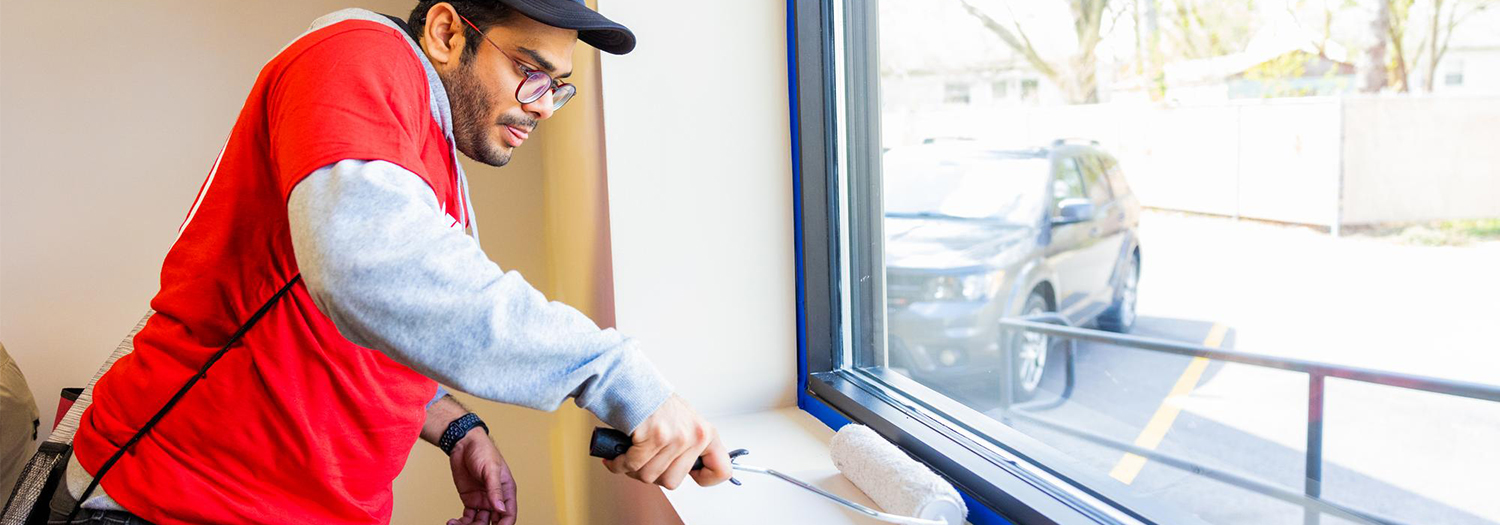- Division of Academic Affairs
- Undergraduate Affairs
- Community-engaged Courses

Community-engaged Courses
NIU’s mission is to empower students through educational excellence and experiential learning as we pursue knowledge, share our research and artistry, and engage communities for the benefit of the region, state, nation and world.
Community engagement is at the heart of NIU. Community-engaged courses give you the opportunity to connect with, and make an impact on, the community around you.
Undergraduate Approved Courses
- ANTH 302 Asian American Cultures
- ARTD 471 Collaborative Photography
- CRIM 484 Rethinking Justice: Alternatives to the Traditional Court System
- CRIM 487 Gender and Crime
- ENVS 210 Introduction to Sustainable Food Systems
- ENVS 303 Nature in Society: Environmental Social Sciences and Humanities
- GERO 265 Overview of Gerontology
- GERO 442 Gerontology: Community Services
- NNGO 351 Nonprofit Boards and Governance
- NNGO 492 Grant Proposal Seminar
- NUTR 450 Quantity Food Systems: Strategic Perspectives on Nutrition and Health
- UBUS 485 Business Consulting Project
- UBUS 490 Topics in Business
Undergraduate Section-approved Courses
- COMD 366x Health Aspects of Aging
- COMS 496R Topics in Persuasion and Social Influence
- ETR 451 Community-based and Participatory Action Research
- ENVS 497 Capstone in Environmental Studies
- GERO 366 Health Aspects of Aging
- KNPE 393 Social Aspects of SportNNGO 302 Introduction to Research in Non-Governmental Organizations and Communities
- NUTR 409 Nutrition Education for Health Promotion
- NUTR 410 Community Nutrition
- TECH 441 Engineering Hazard Controls for Industrial Operations
Graduate Approved Courses
- GERO 542 Gerontology: Community Services
- NNGO 592 Grant Proposal Seminar
- NUTR 550 Quantity Food Systems: Strategic Perspectives on Nutrition and Health
- PSPA 699 Public Service Capstone Project
- SOCI 585 Law and Society
- SOCI 587 Gender and Crime
- UBUS 585 Business Consulting Project
- UBUS 590 Topics in Business
Graduate Section-approved Courses
UBUS 650 Business Opportunities and Technology CommercializationStudents
As a student, you will gain a deeper appreciation and connection with the material you are learning about, while completing community-engaged courses.
Community-engaged Courses Search and Filter in MyNIU
To help you make informed decisions about the courses you choose during registration, you can now search for community-engaged courses in MyNIU.
Apply the "Community-Engaged Course" filter to class searches or search by the keyword "community-engaged course" and community-engaged courses will be included in your MyNIU search results.
Faculty
Graduate and undergraduate courses can be designated as community-engaged through an approval process managed by the Graduate Council and Baccalaureate Council, respectively.
Once implemented, students will be able to see community-engaged course designation in MyNIU and in the graduate catalog and undergraduate catalog.
Paths for Community-engaged (CE) Course Designation
Faculty must first complete this application to apply to have a course designated as community engaged for a section or for the course. A committee of faculty and staff review the applications for section level and course level designation.
Section-level Designation
If the section is approved, the designation will appear in MyNIU for the next semester that the course is offered only.
Course-level Designation
In addition to the application noted above, faculty must also submit a course change proposal through the curriculum platform. Course-level designation requires all instructors who teach that course to meet the criteria as a community-engaged course. It would remain designated in MyNIU until such time as the department requests to remove that designation. The deadline for the course change proposal follows the university curriculum deadlines for publication in the next academic catalog.
These courses will be evaluated on a three-year cycle, so the community-engaged designation can be removed if the course no longer adheres to the requirements.
Designation Requirements
All community-engaged designated courses must include all course components, identify and assess student learning outcomes and submit student assessment results. We will solicit feedback from community partners.
Course Components
To be designated, courses must include the following four components:
- Evidence of working with a community partner (nonprofit organization, business, campus partner, government entity, etc.) Campus partners do not replace working with a community partner external to NIU.
- Students are engaging with issues relevant to the community partner, integrating theory with practice.
- The engagement is intentional and has mutual benefit for the community partner and the students.
- Students use guided reflection to identify and explain their learning and growth as a result of the experience.
Learning Outcomes
To be designated, the course must include at least one learning outcome in two of four Community Engaged Learning Goals (knowledge, skills, disposition, participation) and the instructor must describe how each learning outcome will be assessed in the course. These student learning outcomes should also be included in the course syllabus.
Please review our Community Engaged Learning Goals rubric for more information. VALUE rubrics for each of the 10 learning outcomes are available from the American Association of Colleges and Universities.
The course syllabus should also state that the course is designated as community-engaged so students can understand the expectations of working with a community partner.
Assessment
When submitting a course for designation, the instructor will provide details about how assessment and feedback will be gathered from students. Student assessment data on the selected student learning outcomes will be reported at the conclusion of each semester that the course is offered.
We will also solicit feedback from community partners at the conclusion of each semester that the course is offered. Community partner feedback will be reported to the Baccalaureate Council.
Contact Us
Alicia Schatteman
Vice Provost for Academic Affairs
aschatteman@niu.edu
Jeanie Sparacino
Administrative Assistant
jsparacino@niu.edu
Ian Gawron
Curriculum Coordinator and Catalog Editor
igawron@niu.edu
International Student Scholar Services
isss@niu.edu